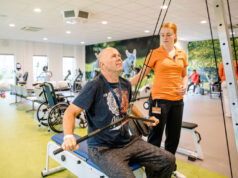 New research published in Nephrology Dialysis Transplantation has found that fatigue, concentration issues, and social disengagement are among the problems experienced by kidney transplant recipients with poor sleep. It has also found that these factors—combined with worse health-related quality of life—are experienced more frequently by women, whose sleep quality did not improve following kidney transplantation.
New research published in Nephrology Dialysis Transplantation has found that fatigue, concentration issues, and social disengagement are among the problems experienced by kidney transplant recipients with poor sleep. It has also found that these factors—combined with worse health-related quality of life—are experienced more frequently by women, whose sleep quality did not improve following kidney transplantation.
The study was led by Tim J Knobbe (University Medical Center Groningen, Groningen, The Netherlands), and sought to explore the factors that contribute to poor sleep in kidney transplant recipients in particular. While chronic kidney disease (CKD) has been extensively associated with worse sleep, “there is limited evidence regarding trajectories of sleep quality before and after transplantation”, Knobbe and colleagues argue. They add that this is an important “yet rather overlooked” aspect of transplant recipients’ health-related quality of life.
Using cross-sectional data from the TransplantLines Biobank and Cohort study, the authors included 872 kidney transplant recipients, 39% of whom were female with ages 56±13 years, as well as 335 healthy controls. One third (33%) of male transplant recipients reported poor sleep compared to around half (49%) of female recipients. Both rates were higher than for controls, with 19% of healthy men reporting poor sleep and 28% of healthy women (p<0.001 for both).
A series of adjusted linear regression analyses found that poor sleep was “strongly and independently associated” with lower individual strength (standardised beta coefficient [st.β] =0.59; 95% confidence interval [CI] 0.45 to 0.74; p<0.001), poorer societal participation in terms of frequency (st.β=-0.17; 95% CI -0.32 to -0.01; p=0.04) and restrictions (st.β=-0.36; 95% CI -0.51 to -0.21; p<0.001), as well as lower health-related quality of life both physically (st.β=-0.53; 95% CI -0.68 to -0.38; p<0.001) and mentally (st.β=-0.64; 95% CI -0.78 to -0.50; p<0.001).
These associations were “partly direct and partly mediated through individual strength”, which itself led to inferior sleep. Longitudinal analysis, the authors detail, also “showed that sleep quality improved after transplantation in males, but not in females”.
Anxiety is identified in the study as a particular risk factor for poor sleep, something the authors note may be hard for transplant professionals to target. “However,” Knobbe et al add, “clinicians must realise that insomnia and anxiety can be treated, preferably by cognitive behavioural therapy rather than pharmaceutical treatment.”
“Sleep quality deserves attention in the transplant nephrologist’s consultation rooms,” Knobbe and colleagues conclude. While they note that how it can best be done was not under examination in their study, the findings suggest that referral to cognitive therapists may be advisable for transplant recipients experiencing reduced quality of life owing to impaired sleep—an issue which poses a particular risk to women.












